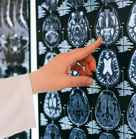

Our group is interested in understanding how the brain works and diseases emerge from a systems perspective to develop the most efficacious therapies for improving our patient's quality of life, suffering neuroinflammatory diseases (like MS) or neurodegenerative diseases (like dementia, ALS, or movement disorders).
The systems biology or systems neurosciences approach considers the brain as a whole, composed of neurons and glia, genes and molecules, brain networks, and cognitive domains. At each level and for each disease, some are more prominent than others, but all must be considered. Then, we use clinical, imaging, neurotechnology, multi-omics, or therapeutic interventions to obtain data, mathematical, statistics, and artificial intelligence to create knowledge and theory and then back to the patients. This is the virtuous cycle of theory-experiments-technology that would allow us to understand how the different diseases of the central nervous systems emerge and propose how to treat them.
From the therapeutic perspective, we are actively pursuing non-invasive neuromodulation for restoring brain network functioning, designing antisense oligonucleotides for treating genetic and sporadic neurodegenerative diseases, or immune tolerization for treating MS or NMO.
Group main research lines
1. Systems Neurology approach to MS and Neurodegenerative diseases
We develop networks and dynamic models of the pathogenesis of MS and neurodegenerative diseases such as Alzheimer's disease to understand the main pathways driving the pathogenesis of the disease. We approach the question by integrating multiple data scales, from molecules to cells, tissues, and the phenotype. Networks allow for integrating complex data and understanding how the system is organized and influences brain functioning. Mathematical modeling adds the time dimension perspective to understanding how brain diseases progress. Finally, modeling the role of therapies in the brain network's functioning is an approach we use to personalize the therapeutic plans.
2. Non-invasive Focused Ultrasound for modulating brain networks
Focused ultrasound (FUS) is a novel approach to modulate the functioning of neurons and glial cells without needing surgery with excellent spatial and temporal resolution. Recent technology improvements, such as using ultrasound transducer arrays and bone aberration correction algorithms, have significantly improved the accuracy of modulating deep brain and cortex neuronal networks. This technology allows inducing lesions (thermal ablations by using high-intensity FUS), opening the blood-brain barrier, enabling liquid biopsy and drug penetration on the CNS, or modulating the activity of the brain networks at the functional level (based on the response of mechanoreceptors present in neurons and glia) using low-intensity FUS. We are developing new hardware and software to modulate CNS regions such as the basal ganglia, cerebellum, spinal cord, and cortex. Indeed, we are conducting clinical trials using approved FUS devices for treating multiple neurology (dementia, ALS, Parkinson's disease, Essential Tremor, Epilepsy, MS) or psychiatric diseases (Major Depressive Disorder, Eating Disorders, or insomnia).
3. N=1 therapies for neurodegenerative diseases by designing antisense oligonucleotides
We are combining the advances in RNA therapy and drug delivery to the CNS by the use of exosomes to design and develop antisense oligonucleotides (ASO) for treating genetic cases of neurodegenerative diseases such as ALS, Frontotemporal dementia, Parkinson's disease, or Huntington disease. We aim to complete the translational process, from mutation identification, ASO design, and animal testing in vitro and animal models to regulatory approval and phase 1/2/3 trials in single cases. This approach will provide critical information for developing ASO for treating sporadic cases targeting neurodegeneration and neuroinflammation.
4. Assessment of the visual pathway for monitoring brain diseases
The visual pathway, starting in the retina, ending in the occipital cortex, and extending to the parietal and temporal cortex, is one of the best-understood brain systems. The visual system is frequently damaged by neuroinflammatory diseases such as MS or neurodegenerative diseases such as Alzheimer's or Parkinson's disease. New technology, such as spectral domain optical coherence tomography, multifocal visual evoked potentials, electroretinography, or eye tracking systems, allow us to exquisitely assess the damage of this system and monitor the progression of brain diseases.
5. Understanding and preventing hearing loss for promoting healthy aging of the brain
Hearing loss due to inflammatory, ischemic, neurodegeneration, and aging are common in the older population. From Sudden Hearing Loss to Presbycusis, hearing loss produces significant disability and is one of the most critical risk factors for developing dementia and social isolation. For this reason, we aim to understand the pathogenesis of the different forms of hearing loss and to develop neuroprotective and therapeutic approaches for preserving hearing and decreasing the risk of dementia.
6. Restoring immune tolerance in demyelinating diseases
Autoimmune diseases such as Multiple Sclerosis (MS), Neuromyelitis Optica (NMO), or MOG-associated disease (MOGAD) require the loss of the natural immune tolerance to self-antigens due to genetic predisposition, environmental factors, and viral infections such as the Epstein-Barr virus. The autoimmune process becomes chronic once the tolerance is broken and requires long-term immunotherapies to prevent the damage. The cure of autoimmune diseases will require restoring immune tolerance. Our team focuses on boosting the acquired regulatory function of the Tr1 cells for restoring immune tolerance in patients with NMO.
Coordinator:
Pablo Villoslada(ELIMINAR)
Tel:
93 316 04 70
Doctor Aiguader, 88
08003 Barcelona
© Institut Hospital del Mar
d'Investigacions MèdiquesLegal Notice and Privacy Policy | Cookie Policy | Site Index | Accessibility | Find Us | Contact